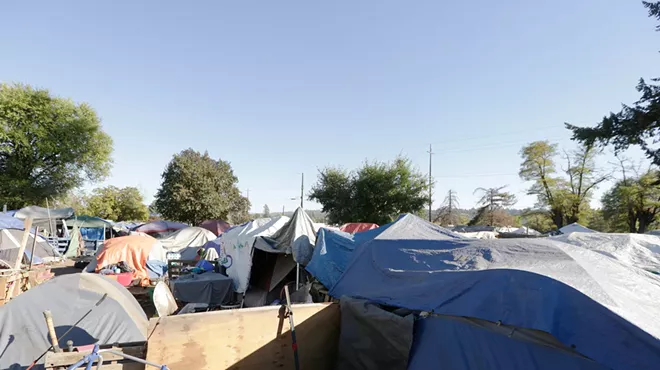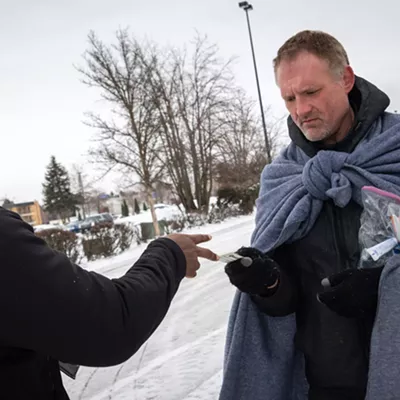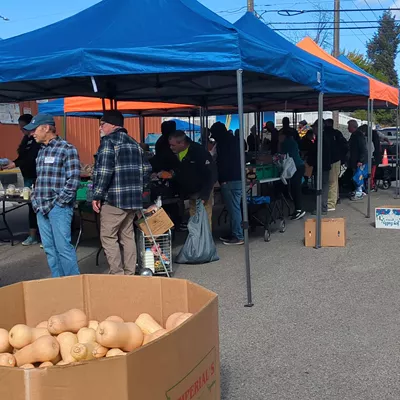
It's not a trivial question. The answer will inform how money is spent, resources are allocated and the development of the path forward for the East Central homeless encampment.
Over the past several days, people and organizations working to decide the future of the camp have given a wide range of estimates.
"About 600" is the most commonly cited number. That's based on a July survey by Jewels Helping Hands that got responses from 601 residents. Julie Garcia, the director of Jewels Helping Hands, says organizers did another headcount two weeks ago and counted 580 campers.
Garcia says there are plans to give residents badges this weekend, which will provide a more up-to-date headcount. She says people have been leaving the camp, and predicts the number will be closer to 400 or 450.
Spokane County Sheriff Ozzie Knezovich, who has pledged to clear the camp by mid-November, gives inconsistent estimates about the camp's size. On Sept. 25, he told the Inlander the total number is probably "more like 400." During a phone call two days later, he said "300." In an article published that same day in The Center Square, the sheriff — who has not been to Camp Hope himself — said the camp has "about 200" residents. During a Sept. 28 appearance on Fox News' morning show, Fox & Friends, Knezovich said firefighters told him it was "anywhere from 150 to 200."
Garcia is skeptical of Knezovich's tallies. "I don't know how the sheriff comes up with his figures, seeing as he's never been to the camp," she says.
As part of his plan to clear the camp, Knezovich has asked Guardians Foundation CEO Mike Shaw for help coordinating outreach work. Shaw says he doesn't know how many people are staying at Camp Hope.
"No one really knows, quite frankly," Shaw says.
Gary, who has lived at Camp Hope since February and asked that his last name not be included, thinks the total number is closer to 700.
"Last one I heard was 750," says Sam Marks, who has also lived at the camp since its beginning.
Zeke Smith, president of Empire Health Foundation, which has been tapped by the state to do outreach work at the camp, says he thinks the population has decreased slightly since the summer, but he hesitates to make firm estimates.
Smith says Empire Health Foundation is starting to do assessment work at the camp that will provide a more accurate picture of the total number of campers and their individual needs in coming days.
"Once we have those initial assessments, we'll be in a better place to understand some realistic goals," Smith says.
When I visited on Sunday, Camp Hope did look a bit smaller than it did over the summer, but it's really hard to say for sure. Some of the RVs and tents on the periphery have been moved inwards to make room for a perimeter fence, which does make the camp look a bit smaller. It's tricky, since some of the people I talked to that day said they camp in other parts of the city, but still visit Camp Hope often. If I had to make a rough visual guess, I'd say the camp has somewhere between 450 to 650 residents, but don't quote me on that.
A few days after he announced his plan to clear Camp Hope, Knezovich told me that critics were "gaslighting" when they accused him of criminalizing homelessness. He insisted that his department is criminalizing behavior that breaks the law, not homelessness itself.
"Homelessness is not against the law," Knezovich said. "Behavior during your time as homeless breaks the law."
I asked the sheriff if he thinks every person at Camp Hope is breaking the law.
"If you're putting poison into your body and buying drugs... well I guess I forgot we live in the state of Washington [where] that's okay. But morally, it's not," the sheriff said. "Morally, that is state-assisted homicide."
Knezovich is referring to recent changes in Washington state law that effectively decriminalized some types of minor drug possession. It's worth noting that the sheriff's job is to enforce laws, not morals.
Even then, does the sheriff think every person at Camp Hope is using drugs?
"If those people really wanted help — because you're telling me now they're clear-thinking, logical individuals?" Knezovich said. "You're telling me that after nine months nobody could get them help? Honestly?"
Knezovich said he doesn't think there are people at Camp Hope who aren't doing drugs.
"If you can find them, I want to meet them," Knezovich said.
On Sunday afternoon, Sam Marks and Gary were working to patch holes that appeared in Camp Hope's newly-constructed perimeter fence overnight. Both men are employed as security by Jewels Helping Hands. They say the sheriff is misinformed. Not just about the size of the camp, but also about the campers themselves.
"Not all of us are scumbags," Marks says.
"Not everybody steals, not everybody does drugs," Gary adds.
They're both open about the fact that crime and drug use are a problem at the camp, but they say it's not a majority of residents. In many cases, the crime is caused by bad actors who don't live at Camp Hope, but still use the camp for cover and shift blame towards the residents, Gary says.
"Everybody blames everything on the homeless anyway," Gary says.
Gary says he hasn't done drugs since 1988 when he was "young and dumb." Gary, 59, joined the military in the 1990s, and says the trauma associated with his service has made it difficult for him to stay in shelters.
"I can't be around that many people," he says, "my head starts clouding up."
Gary also has two large dogs, Scout and Little Mamas, who wouldn't be allowed in.
"You can go back to him and tell him: 'No, they aren't all doing drugs,'" Gary says of the sheriff.



























